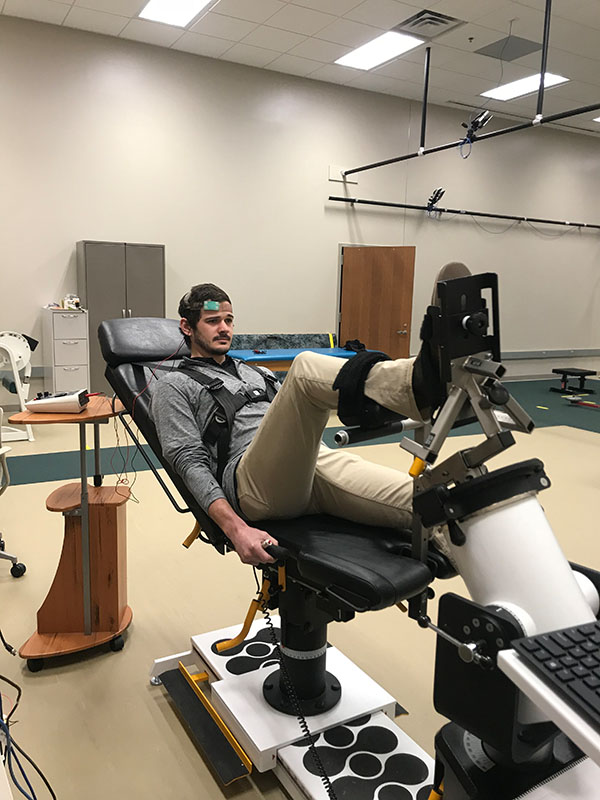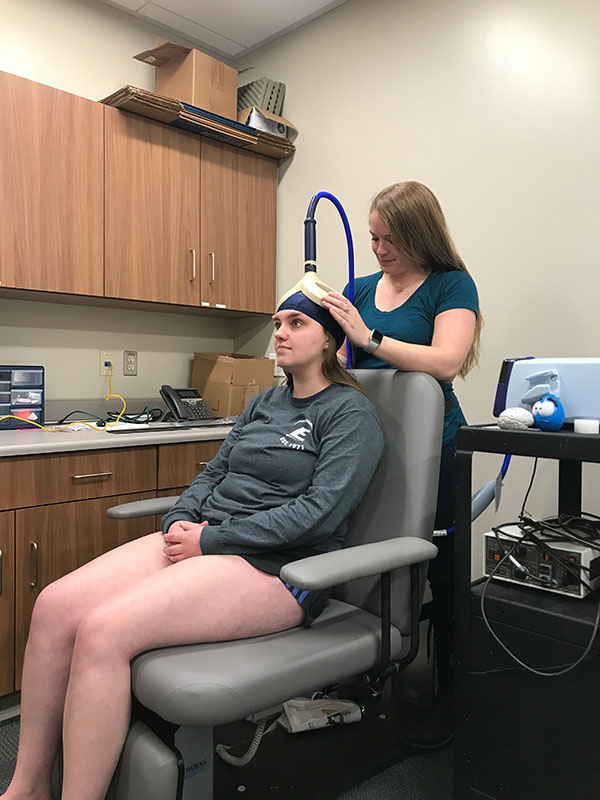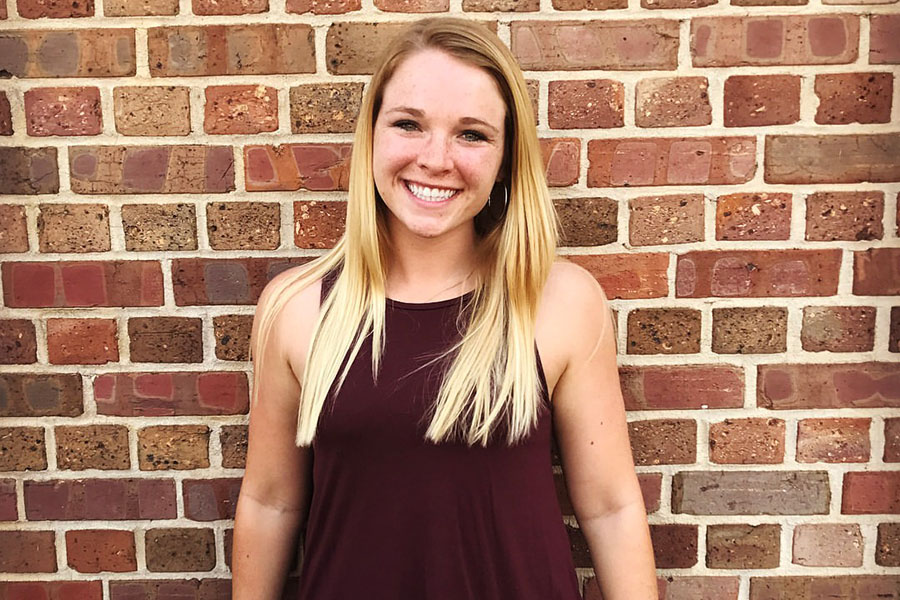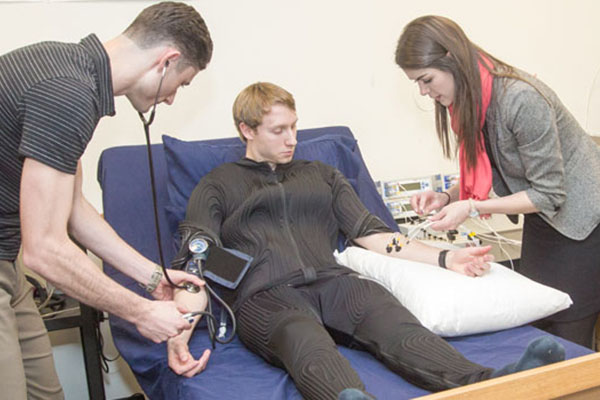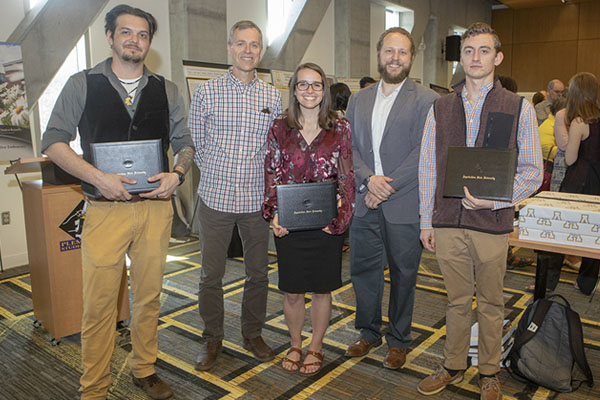BOONE, N.C. — Research conducted by Amelia Bruce ’19 while a graduate student at Appalachian State University suggests ankle injuries can be better treated by targeting the brain. The results of this groundbreaking study have been published in the February issue of Medicine and Science in Sports and Exercise, the official journal of the American College of Sports Medicine.
Bruce, who is from Taylorsville, earned an M.S. in exercise science from Appalachian and is currently pursuing her Ph.D. in kinesiology at the University of Virginia.
While at Appalachian, Bruce worked with Dr. Alan Needle, associate professor in the Beaver College of Health Sciences’ Department of Health and Exercise Science. Needle’s previous research had shown the brains of people with ankle instability need more brain activation to do simple tasks. Bruce took the lead with the next step, testing the impact of brain stimulation in treating ligamentous injuries.
Highlights of the study:
- Four weeks of ankle strengthening therapy was performed for 26 study participants. Half received an electrical current through their brain during sessions, while the other half received a placebo current.
- Strength training paired with the electrical current improved the way participants’ brains connected to the ankle muscles, resulting in better balance, muscle activation and perceived function.
- This study was the first to show using treatments that target the brain improves neural function in patients with injuries, and improving neural function amounts to better ankle function and perceived outcomes.
“This topic was of importance to me because injuries in ligaments happen every day. If this intervention worked, it could reshape how clinicians treat these types of injuries during the rehabilitation phase,” Bruce said.
“While clinicians primarily treat the musculoskeletal side (during the rehabilitation phase), there is a whole neural system that is impacted by these injuries and needs just as much attention during treatment,” she added.
When a sprain occurs in ankle ligaments, the brain directs the body to compensate by changing the patient’s gait, Bruce explained. This subconscious compensation causes a weakness in the ankle that leads to recurrent sprains over a patient’s lifetime — potentially leading to inactivity and related obesity, cardiovascular disease and other health problems.
“We want to nip that in the bud before it gets to that point by changing the way the brain reacts to the injury,” Bruce said.
Bruce presented her research findings at several conferences, including the following:
- Appalachian’s 2019 Annual Celebration of Student Research and Creative Endeavors, sponsored by the Office of Student Research, in which Bruce was one of three graduate student winners in the event’s Student Poster Competition.
- The 2019 Human Movement Science Research Symposium held at the University of North Carolina at Chapel Hill.
- The 2019 National Athletic Trainers’ Association Convention in Las Vegas.
- The 2019 International Ankle Symposium in Amsterdam, sponsored by the International Ankle Consortium.
- The 2019 International Symposium on Regenerative Rehabilitation in Charlottesville, Virginia.
Bruce plans to continue her research at the University of Virginia by testing patients with knee ligament injuries.
What do you think?
Share your feedback on this story.
About the Beaver College of Health Sciences
Appalachian State University’s Beaver College of Health Sciences (BCHS), opened in 2010, is transforming the health and quality of life for the communities it serves through interprofessional collaboration and innovation in teaching, scholarship, service and clinical outreach. The college enrolls more than 3,600 students and offers 10 undergraduate degree programs, nine graduate degree programs and four certificates across seven departments: Kinesiology, Nursing, Nutrition and Health Care Management, Public Health, Recreation Management and Physical Education, Rehabilitation Sciences, and Social Work. The college’s academic programs are located in the Holmes Convocation Center on App State’s main campus and the Levine Hall of Health Sciences, a state-of-the-art, 203,000-square-foot facility that is the cornerstone of Boone’s Wellness District. In addition, the college supports the Appalachian Institute for Health and Wellness and has collaborative partnerships with the Wake Forest University School of Medicine’s Physician Assistant Program, UNC Health Appalachian and numerous other health agencies. Learn more at https://healthsciences.appstate.edu.
About graduate education at App State
Appalachian State University’s Williams School of Graduate Studies helps individuals reach the next level in their career advancement and preparedness. The school offers 80 graduate degree and certificate programs — both in person and online — in a range of disciplines, including doctoral programs in education (Ed.D.) and psychology (Psy.D.). The graduate school enrolls nearly 2,000 students. Learn more at https://graduate.appstate.edu.
About Appalachian State University
As a premier public institution, Appalachian State University prepares students to lead purposeful lives. App State is one of 17 campuses in the University of North Carolina System, with a national reputation for innovative teaching and opening access to a high-quality, cost-effective education. The university enrolls more than 21,000 students, has a low student-to-faculty ratio and offers more than 150 undergraduate and 80 graduate majors at its Boone and Hickory campuses and through App State Online. Learn more at https://www.appstate.edu.
